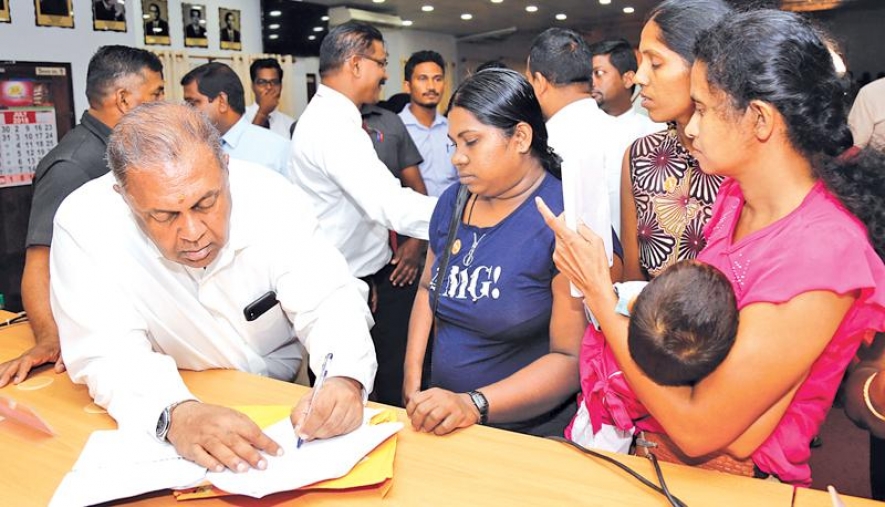The reason is a combination of factors. From extreme poverty to a severe drought and failure of the rural economy to take off in the post-war period has left people obtaining loans from predatory microfinance companies and loan sharks in a desperate bid to survive and rebuild.
Activists and researchers say microfinance lenders have duped people into taking easy loans, charging anywhere between 40-220 % interest on the borrowings. Some even started handing out daily and weekly loans, no questions asked, no documents required. But as more loans were given out, the harassment meted out by debt collectors also increased, with intimidation of women becoming a common occurrence.
In a Province dominated by women-headed households, the victims of this debt trap are mostly women. Without guarantors and collateral, banks will not lend to these impoverished families, economists working in the Northern Province explain. The only credit option for most people became micro-finance companies, which have become predatory and exploitative in a vulnerable region still in post-war recovery.
Debt and predatory lenders are a problem all over the country, says Jaffna-based political economist Dr. Ahilan Kadirgamar, who works closely with community organisations and the Ministry of Finance, trying to resolve the issue. “But it is when the problem hits a war-affected region that you see the adverse consequences happen very quickly,” Kadirgamar told the Sunday Observer last week.
Unable to repay the debt, many opted for suicide. Others went into hiding trying to shake off debt collectors who were constantly at their heels. Some took loan on top of loan from different micro-finance companies to repay debt, eventually getting trapped in a cycle from which there was no escape. Protests erupted as families crushed by mounting debt pleaded with the authorities to rein in predatory lenders.
Last week, following months of negotiations and planning, the Government finally stepped in to help, rolling out several policies to address the issue.
inance Minister Mangala Samaraweera and Prime Minister Ranil Wickremesinghe led a delegation to the Northern Province last week, to announce the measures. In a widely hailed move, Minister Samaraweera told a Kachcheri filled with families struggling to repay debt in Jaffna, that the Government had decided to write off loans taken by women from all finance companies up to the value of Rs 100,000.
The write off will be effective in 12 districts, in the North, North Central and North Western Provinces, all of which were badly affected by drought over the past several years. Agricultural communities found debts mounting, as they borrowed to keep their heads above water as season after the season of paddy failed, badly affecting incomes.
“This scheme will initially be limited to women who have obtained microfinance loans for non-consumption purposes in the drought-affected districts of Trincomalee, Ampara, Batticaloa, Jaffna, Mullaitivu, Kilinochchi, Vavuniya, Mannar, Kurunegala, Puttalam, Anuradhapura and Polonnaruwa where cultivation was affected consecutively for five seasons,” the Minister announced at the Jaffna Kachcheri last Sunday. Dr Kadirgamar says this move has managed to cover many women in the North who are currently in debt. “It will be a great relief for them,” he said. He points out that last year during consultations held by the Central Bank Governor in the North it was identified that reducing the accumulated debt is of utmost importance, resulting in the recent write-off.
Also in a bid to control the microfinance companies the Cabinet this week approved a cap on annual interest rates, limiting it to 30%. Kadirgamar says this was a very important decision as it will weed out a large number of microfinance companies operating in the North. “For many, this rule will not work with their high profit-oriented business models,” he says explaining that as a result many will exit the market leaving those who are able to provide loans at these rates to remain and operate. Dr Kadirgamar says the decision by the Government to write off these loans will leave a clean slate. “But it’s important to ensure this will not happen again,” he explained.
The debt crisis started when the post-war reconstruction strategy was to expand credit and encourage people to take Central Bank backed loans to uplift livelihoods, the economist explains. In 2009-2011, as gold prices soared during the global financial crisis, many families in the North pawned jewellery and went on to lose it. “This was one of their main liquid assets available for emergency financial needs,” Dr Kadirgamar noted. As repossession of assets by lenders became common during attempts to become self-employed many simply sank deep into financial difficulties. These reasons along with rampant unemployment created the necessary scenario for microfinance lenders to come in and operate sans any restrictions. “This is how it became a huge crisis,” Kadirgamar says.
With smaller micro-finance companies likely to be driven out of the market with the interest rate cap, economists say people in the region will still need to have access to emergency credit in the event of accidents or inability to work.
To ensure credit options are available, the Government has decided to infuse Rs 500,000 for rural credit programmes through cooperative banks operating in small villages across the Northern Province. People can apply for a Rs 20,000 loan at 14 % interest through district cooperatives, to meet emergencies.
“This is to ensure the people do not go back to predatory lenders and to make credit available to them,” Kadirgamar says. While the moves will no doubt provide relief to those affected, however the cap on interest rates thereby lowering it has caused concern among some members of the public.
Among those is Vethavalli Selvaratnam, the Secretary of the Jaffna District Cooperative. While appreciating the Government decision, Selvaratnam says she feels the moves were cosmetic. According to her not having received the correct information on the write-offs, many women now think they can borrow smaller loans which will also be paid off by the Government. “They are even discussing on how they can borrow more for now with the lowering of microfinance interest rates means the repayment amounts will be lesser,” she says adding that it was a serious matter of concern.
She is also worried that microfinance companies will find their way around the recently implemented regulations. “They are very shrewd, we have seen how they operate, so I worry they will come up with a better package than the Government is offering the people,” she says. While cooperatives are set to provide emergency loans, the Government now intends to provide larger loans through its recently launched Enterprise Sri Lanka programme which provides subsidised credit to those looking to start their own business ventures and to uplift the livelihoods. Dr Kadirgamar says previously loan disbursement from local banks have been low in the North. “The banks have been reluctant to provide loans due to being in an economically bad situation,” he said. According to him now with the Treasury backing the subsidised loan scheme, banks may change their attitudes about lending to the people, increasing productivity.
As Minister Samaraweera handed the first batch of Enterprise Sri Lanka loans to chosen individuals in the North last week, previous loans obtained appeared to weigh heavily on the mind of Ilankeeran Saraswathi. She was obtaining a loan to dig a well in her garden. “I have taken several other loans and I find it difficult to pay them back,” she says. Tamilarasi from Mannar (name changed at her request) was also obtaining a loan through the Enterprise Sri Lanka scheme to repay a housing loan obtained by her father. Having suffered a stroke, he has been unable to make the repayments she says. Nagendran Jesudan (24) from Illupukadawei in the past few years has been struggling to find work. Under the Enterprise Sri Lanka program, he obtained Rs 600,000 to purchase new gear for fishing. He believes with better gear he will be able to make around Rs 7,000 daily.
President of the Ambal Cooperative Society K. Rajachandran hailed the Government moves to address debt and credit issues, in a bid to uplift lives and livelihood. The Cooperative Bank attached to the Karainagar Multi-Purpose Cooperative Society that Rajachandran leads will also get a cash infusion from the Treasury to provide credit for people in the area. “This is the first time since the end of the war that the Government has stepped in like this and focused on rural upliftment,” says Rajachandran, “for us this is a huge thing.”
According to Kadirgamar unless employment along with income schemes is expanded the issue of debt cannot be completely resolved. “We must invest in job creation and the rural economy to provide people with livelihoods,” he says.
“For nine years we were not even on the right path to correct the issue,” he says adding that the country now must change course to a new development strategy that works and introduce a more holistic approach to resolve the debt crisis in the North.




















